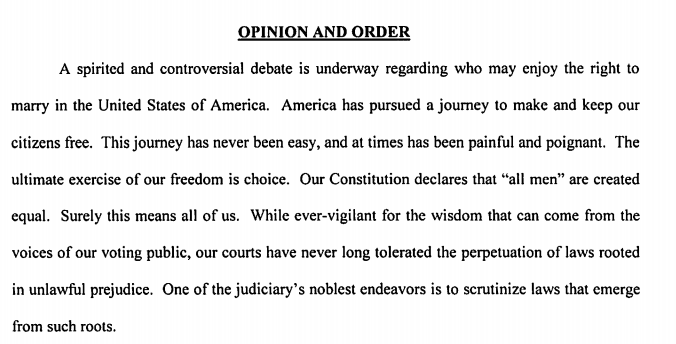Judge Wright Allen, who begins her opinion striking down Virginia’s ban on same-sex marriage with much prose–including a lengthy quotation from Mildred Loving–makes such an obvious blunder that it makes my ConLawProf skin crawl.
Our Constitution declares that “all men” are created equal. Surely this means all of us.
The “Constitution”? Really?!
I suspect Judge Wright Allen was referring to the Declaration of Independence, which emphatically states:
We hold these truths to be self-evident, that all men are created equal, that they are endowed by their Creator with certain unalienable Rights, that among these are Life, Liberty and the pursuit of Happiness.
In fact, our Constitution does not include the word “male” until the 14th Amendment.
When my first year law students get the Declaration and the Constitution confused, I shrug, and chalk it up to the lack of civic education in our schools (which is why I value so highly my work at the Harlan Institute). When an Article III judge does it, in an opinion interpreting our Constitution, I cringe. This should be fixed.
Update: In the comments, someone noted that Judge Wright Allen may be referring to the Virginia Constitution by “Our Constitution”. Section 1 of the Virginia Constitution begins:
That all men are by nature equally free and independent and have certain inherent rights, of which, when they enter into a state of society, they cannot, by any compact, deprive or divest their posterity; namely, the enjoyment of life and liberty, with the means of acquiring and possessing property, and pursuing and obtaining happiness and safety.
This provision is taken directly from Virginia’s Declaration of Rights, authored on June 12, 1776 (weeks before the Declaration of Independence) by the namesake of my alma matter, George Mason.
- THAT all men are by nature equally free and independent, and have certain inherent rights, of which, when they enter into a state of society, they cannot, by any compact, deprive or divest their posterity; namely, the enjoyment of life and liberty, with the means of acquiring and possessing property, and pursuing and obtaining happiness and safety.
There is a wonderful plaque at GMU that bears these words, so it is a phrase I am very familiar with.
Is it possible Judge Wright Allen meant to refer to the Virginia Constitution here by saying “Our Constitution”? Maybe I should give her the benefit of the doubt.
Though, I am skeptical for a few reasons.
First, if she wanted to quote, or at least cite the Virginia Constitution, she should have used the language in the actual Constitution. There is a difference between being “created equal” (the exact language Jefferson put in the Declaration) and being, “by nature equally free.” A citation also would have been helpful.
Second, and perhaps more importantly, the Virginia Constitution has absolutely nothing to do with this court’s analysis. The law was struck down under the Federal Constitution. Even more striking, Virginia’s ban on same-sex marriage is in the Virginia Constitution! See footnote 2:
2Unless otherwise noted, “Virginia’s Marriage Laws” refer to Article I,Section 15-A of theVirginia Constitution, the statutory provisions cited herein, and any other law relating to marriage within the Commonwealth of Virginia.
The very Constitution that speaks of all men being “by nature equally free” also limits marriage to those of the opposite sex. There’s no way her invocation of the Virginia Constitution could possibly be right. It is only under the federal Constitution that this law is invalid.
Which brings me to the third, and most meta point. Judge Wright Allen is a Judge of the United States. She holds her commission by virtue of the United States Constitution. She is not a judge of Virginia, regardless of her place of domicile. For purposes of the Eastern District of Virginia, “our Constitution” means the Federal Constitution.
Update: A reader notified me that the court has modified the opinion to note that the phrase “all men are created equal” is in the Declaration not the Constitution.
It now reads:
Our Declaration of Independence recognizes that “all men” are created equal. Surely this means all of us.
Here is the original opinion:
Here is the amended opinion:
The court also changed “declares” to “recognizes” because “Our Declaration of Independence declares” doesn’t sound good. Though, that they used the word “Constitution” and “declares” in the same sentence, in the original, is poetic.
I’m glad the court has corrected this error.
Update: The court’s mistake, unfortunately, is indicative of broader societal ignorance about the Constitution. A survey performed by the National Constitution Center found that 84% of respondents “incorrectly believe that the Constitution states that ‘all men are equal.'”
H/T M.M.

